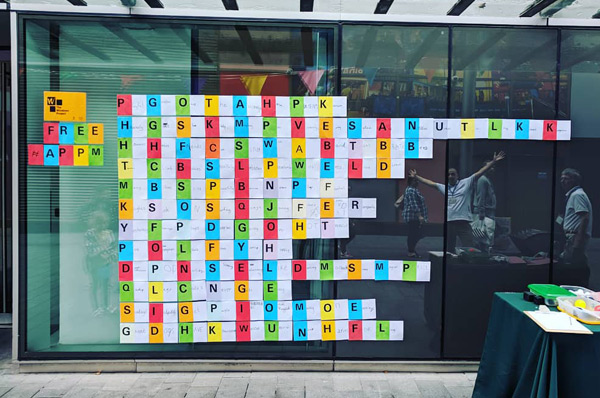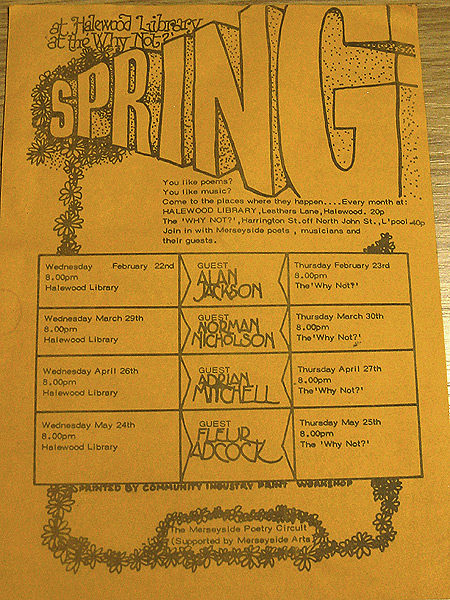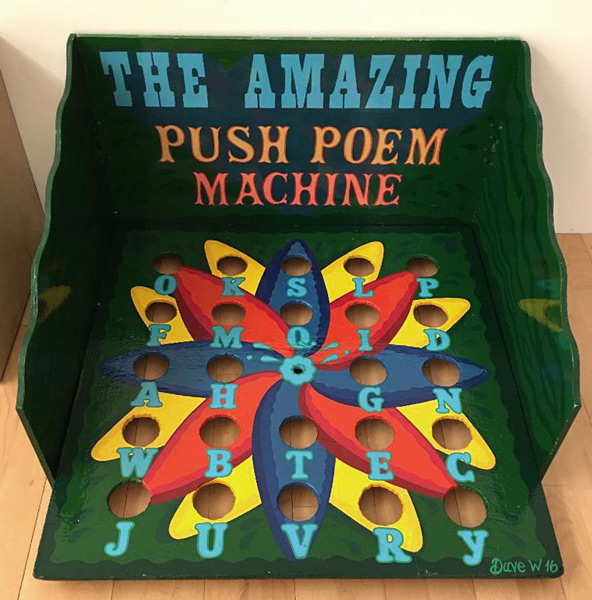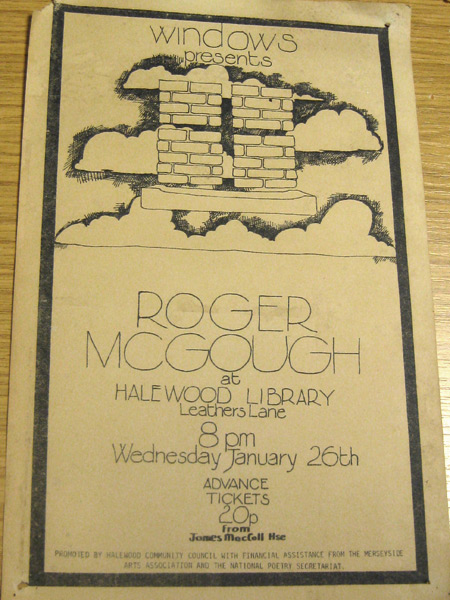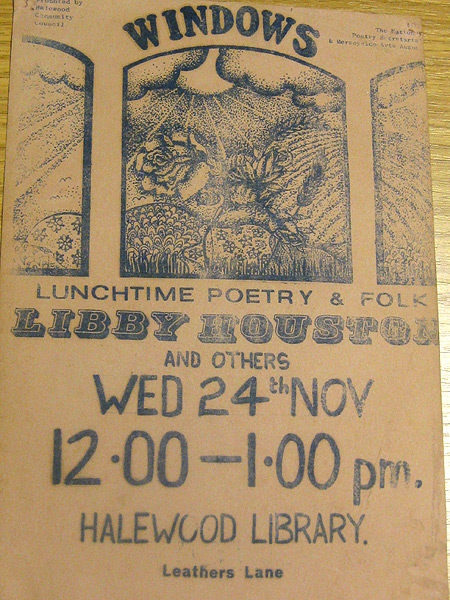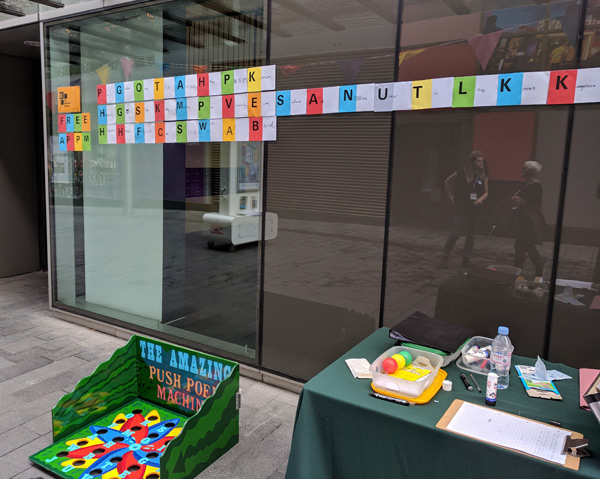Cornelia Gräbner opens on the curtains on the history one of Nerve’s old neighbours, the Windows Project.
The office of The Windows Project is surrounded by internal and external windows, offering an outlook into the city and an invitation to come in. Shelves full of boxes and papers convey a sense of hidden treasure that is just waiting to be discovered. The Windows Project is one of the oldest community arts poetry projects in the country. It has been around since 1976. Its coordinator is Dave Ward, who was also one of its founders.
Windows emerged on the back of the vibrant experimental poetry and community arts scene of the late 1960s and 1970s in Liverpool City Centre. Dave Ward and his colleague Dave Calder had been working for and at the Black-E in different capacities, had set up poetry ‘events’, and been involved in creative playgroups and arts events. The Black-E’s mission was to make art accessible to a wide range of people. To do so, its directors Bill and Wendy Harpe encouraged experimentation with new, unconventional and, as we now know, trailblazing formats. They took theatre, poetry and visual arts to the streets and parks of Liverpool, and ran events at the Black-E that attracted people through playfulness; among other things, they pioneered the use of inflatables for play.
When Dave Ward moved to Halewood in the early 1970s, he took what he had learned at the Black-E with him. He set up a monthly poetry group in Halewood Library: ‘Looking back’, he says, ‘one wonders: how did that work? But it did. We’d get a regular audience of around 30 every month for big name poets being booked in and local people coming to read their own [poems] and to do some music. The local librarian would just give us the key to the library and say “you lock up at the end of the night.” You couldn’t do that now.’ Halewood residents were not only interested in hearing poets read; many also wrote their own poetry. After several people had approached Dave to tell him about the poems they wrote, he decided that this little poetry scene needed nurturing. They named the new group ‘Windows’, after a poem written by local poet and dinner lady Isolda MacLean, and billed the poetry nights as ‘Windows’. In 1974, they started Smoke Magazine and in 1976, a group consisting of Dave Ward, Dave Calder, Libby Houston and Carol Ann Duffy were invited by Merseyside Play Action Council to run playful poetry workshops in the area. This is when they came up with one of Windows’ most ingenious and long-lasting inventions: the Amazing Push Poem Machine. This fabulous and magical machine uses a playful method of ‘skill and random chance’ that Dave Ward devised at the Black-E to get people in the mood for creating poems. It is still in use today.
A few years later, ‘The Windows Project’ became an organisation with a constitution and could now apply for Arts Council Funding. Since then, the project has sustained a range of complementary activities. Among them are collective workshops and experimental creativity, Smoke Magazine, the Small Press Library, and the Writing Advice Desk and mentoring for young poets.
The workshops cater to people who, as Dave Ward now says, ‘wouldn’t otherwise think about doing some writing.’ The workshops and the Amazing Push Poem Machine incentivise them to play and to experiment, and to try their hand at writing. Windows have worked with people in psychiatric institutions and prisons, in schools, and with community organisations, helping them to see and to express the poetry in the world they live in every day.
“they came up with one of Windows’ most ingenious and long-lasting inventions: the Amazing Push Poem Machine… It is still in use today.”
Mentoring programs and the Writing Advice Desk are for those who are individually motivated to write, whether on the back of a Windows workshop or for reasons of their own. The Writing Advice Desk used to be run once a month at Central Library, and people could bring their drafts to discuss them. It hasn’t run since the pandemic, but Windows is hoping to get Arts Council funding for it again. Some of the poets eventually became mentors themselves. You can watch a showcase of poets that came out of The Windows Project in a shared event with poets from poetry projects in Cork and A Coruña here: Nurturing Poets: Eight Poets from Port Cities – Liverpool, A Coruña and Cork – YouTube.
Smoke Magazine, started in 1974, gives poets an outlet and creates a poetry community beyond Merseyside. Over the years, the little magazine has attracted contributions and readers from all over the world.
The Small Press Library is part of Window’s archive and is now housed at Central Library. It started off with the foundation of Smoke Magazine, and the keeping of review copies and exchange copies of other magazines. Soon the people at Windows realized that this was not just ‘stuff kept in a carrier bag’, as Dave Ward puts it, but a small archive, and they started building it by requesting copies from small magazines. The Small Press Library now holds around 5000 pamphlets, fanzines, poetry publications and literary magazines, reaching back as far as the mid-1960s and being enlivened in unexpected ways in the digital age: ‘We have student placements’, says Dave, ‘And every time I take them to look at it, they’re amazed by it. They have a yearning for physical objects because everything is on screens now. But in the Small Press Library there’s everything from duplicated small print run things to glossy magazines.’
With dogged single-mindedness and enthusiasm, Dave Ward and his team have navigated The Windows Project through all sorts of waters and weathers, from its iconoclastic beginnings to the managerialized funding landscape of the 21st century, where what doesn’t fit into a box is allowed only when it fits the box for what doesn’t fit into the box. The iconoclastic, experimental arts and poetry scene of the 1960s and early 1970s created the initial energy for Windows. The ethos of community arts has channelled, nurtured and sustained this energy until the present day.
Listen to Dave Ward, Paul Casey (ó Bhéal, Cork) and Yolanda Castaño (Residencia 61 and InVerso, A Coruña) speak about what it takes to create a nurturing environment and a ‘social infrastructure’ for poetry in the medium and long term: https://www.youtube.com/watch?v=gb0PhmbQDkI
The Writing Advice Desk is running again – first Wednesday of every month, 5.30pm – 7.00pm in Central Library
